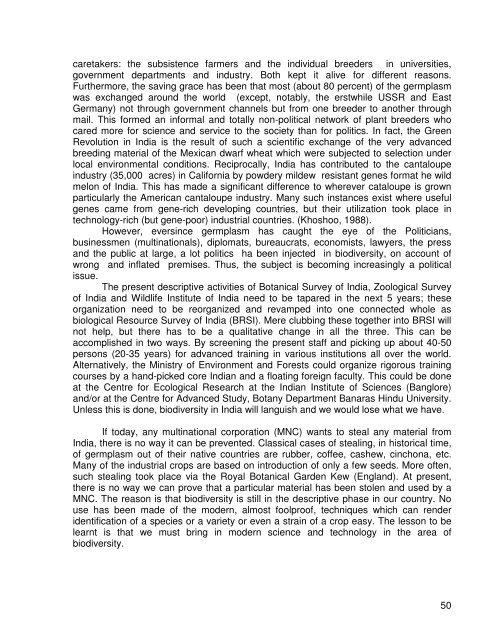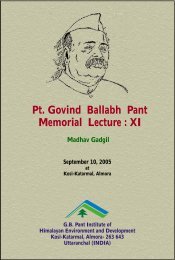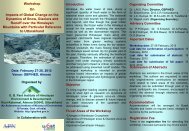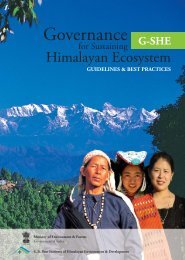Pandit Govind Ballabh Pant Memorial Lecture: II
Pandit Govind Ballabh Pant Memorial Lecture: II
Pandit Govind Ballabh Pant Memorial Lecture: II
You also want an ePaper? Increase the reach of your titles
YUMPU automatically turns print PDFs into web optimized ePapers that Google loves.
caretakers: the subsistence farmers and the individual breeders in universities,<br />
government departments and industry. Both kept it alive for different reasons.<br />
Furthermore, the saving grace has been that most (about 80 percent) of the germplasm<br />
was exchanged around the world (except, notably, the erstwhile USSR and East<br />
Germany) not through government channels but from one breeder to another through<br />
mail. This formed an informal and totally non-political network of plant breeders who<br />
cared more for science and service to the society than for politics. In fact, the Green<br />
Revolution in India is the result of such a scientific exchange of the very advanced<br />
breeding material of the Mexican dwarf wheat which were subjected to selection under<br />
local environmental conditions. Reciprocally, India has contributed to the cantaloupe<br />
industry (35,000 acres) in California by powdery mildew resistant genes format he wild<br />
melon of India. This has made a significant difference to wherever cataloupe is grown<br />
particularly the American cantaloupe industry. Many such instances exist where useful<br />
genes came from gene-rich developing countries, but their utilization took place in<br />
technology-rich (but gene-poor) industrial countries. (Khoshoo, 1988).<br />
However, eversince germplasm has caught the eye of the Politicians,<br />
businessmen (multinationals), diplomats, bureaucrats, economists, lawyers, the press<br />
and the public at large, a lot politics ha been injected in biodiversity, on account of<br />
wrong and inflated premises. Thus, the subject is becoming increasingly a political<br />
issue.<br />
The present descriptive activities of Botanical Survey of India, Zoological Survey<br />
of India and Wildlife Institute of India need to be tapared in the next 5 years; these<br />
organization need to be reorganized and revamped into one connected whole as<br />
biological Resource Survey of India (BRSI). Mere clubbing these together into BRSI will<br />
not help, but there has to be a qualitative change in all the three. This can be<br />
accomplished in two ways. By screening the present staff and picking up about 40-50<br />
persons (20-35 years) for advanced training in various institutions all over the world.<br />
Alternatively, the Ministry of Environment and Forests could organize rigorous training<br />
courses by a hand-picked core Indian and a floating foreign faculty. This could be done<br />
at the Centre for Ecological Research at the Indian Institute of Sciences (Banglore)<br />
and/or at the Centre for Advanced Study, Botany Department Banaras Hindu University.<br />
Unless this is done, biodiversity in India will languish and we would lose what we have.<br />
If today, any multinational corporation (MNC) wants to steal any material from<br />
India, there is no way it can be prevented. Classical cases of stealing, in historical time,<br />
of germplasm out of their native countries are rubber, coffee, cashew, cinchona, etc.<br />
Many of the industrial crops are based on introduction of only a few seeds. More often,<br />
such stealing took place via the Royal Botanical Garden Kew (England). At present,<br />
there is no way we can prove that a particular material has been stolen and used by a<br />
MNC. The reason is that biodiversity is still in the descriptive phase in our country. No<br />
use has been made of the modern, almost foolproof, techniques which can render<br />
identification of a species or a variety or even a strain of a crop easy. The lesson to be<br />
learnt is that we must bring in modern science and technology in the area of<br />
biodiversity.<br />
50











